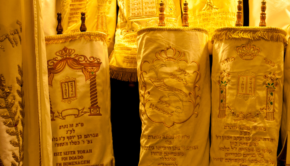Purim and Gift
Purim is about the miracles that can happen in our daily lives
In the Purim story Esther, Mordecai and the Jews of Persia face imminent destruction. But are saved in the end, not by God coming down and splitting the sea or smiting their enemies, but by the hidden miracles that can look like chance or coincidence. They are also saved by people’s actions, like Esther’s when she puts aside her own self-interest and throws her lot in with the larger group. At the turning point in the story, when Haman’s decree against the Jews of Persia becomes known, Mordecai sends her a message that she needs to go into the inner chambers of the king to ask him to annul the evil decree. Esther knows that anyone who comes into that inner sanctum without being called is sentenced to death, unless the king offers them his golden scepter. She sends a message back to Mordecai, “Gather all the Jews of Shushan and tell them to fast for me for three days. . .and me and my servants will also fast, and thus I’ll go to the king against the rules — if I’m lost, I’m lost. (Esther 4:16)
Purim is about the miracles that can happen in our daily lives. It is also about putting the good of the whole before your own individual self-interest. The miracles and this shift in perspective toward the whole are related, and they are essential to the paradigm shift that we need to make today to avoid the destruction – cascading ecological, social, political, health crises – that we face. When we break the spell of the individualistic, atomized and fractured perspective that has become the pervasive culture we inhabit—and enter into the whole, we can create the conditions for miracles. We can tap into the emergence that is the “whole is greater than the sum of the parts,” and its power that is way beyond that of each individual’s.
A small thing like gift giving is a way of re-igniting that flame of solidarity and bonds of friendship, not just with an individual or two but with the whole group. One of the customs of Purim is to give gifts: ishlo’ach manot – giving gifts of food to friends, and also matanot l’evionim—gifts to those in need, especially of food. These are not the famous, flashy customs of Purim like getting dressed up in crazy costumes, putting on a shpiel and getting drunk, but they are equally important in creating the conditions for noodging us beyond our normal, isolated selves.
One little known custom of mishloach manot, the gifts of food to friends, is to give food not directly, but through an intermediary. Why is this—literally—roundabout approach preferred?
It makes sense in anthropological Gift Theory – the theory of gift exchange as contrasted with commodity exchange. Commodity exchange of goods and services is what we’re used to in our economy – it’s what people these days call “transactional”—meaning impersonal, emotionally neutral, creating no bonds or connections, just exchanging one thing for another. Buying on Amazon, or even worse, choosing the self-register instead of at least interacting with a human being at the cash register to say “hello, how are you? Thank you, have a good day” – is the ultimate in commodity exchange. Gift exchange is also exchanging goods and services from one to another, but the main point of these exchanges is creating bonds between people. When I give a bar/bat mitzvah gift, it’s not primarily for practical purposes—it’s about being part of a community and affirming our connections. There are whole societies where the economy is based on gift exchange, meaning that the building of trading partners and the solidarity that brings to the whole group is more important than profits and capital accumulation.
So, back to mishlo’ach manot. I think the custom of giving through an intermediary exists because, when you have a gift that you receive directly from a friend, the impulse is to give an equivalent gift right back. It can feel a little like a commodity exchange that doesn’t really strengthen the bonds of the whole group. But if you get it from a third party it creates a circle. You don’t give right back, but you create a society of gift givers, all counting on the general generosity of the group.
This is a time when we need a shift in paradigm from being individuals maximizing profit and personal benefit, to being cells within an organism that play our individual roles, joyfully participating and giving our individual talents to the larger life of the group. On Purim, we’re invited to let down our guard, dressing up like someone else or a different version of ourselves that we’ve been hiding, perhaps shaking up consciousness with some beverage or herb, and most importantly, reaching out and connecting with people, helping one another, and knowing that when we are part of something larger, each one of us plays our role and contributes to the whole. That is a joyful space where miracles can happen.
-Rabbi Natan Margalit, Ph.D.






